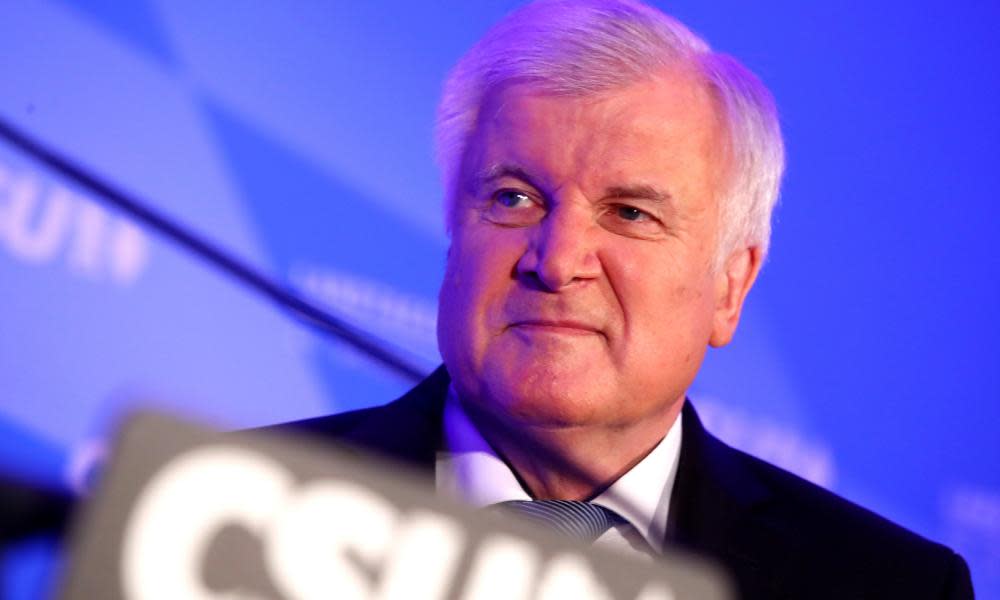Bavarian conservatives’ immigration policies cost them the election

It is, as Der Spiegel said, as if the all-conquering Bayern München, Germany’s most successful ever football club, had been ignominiously relegated – but with rather more far-reaching consequences.
The CSU, the sister party of Angela Merkel’s CDU, has dominated Bavarian politics for six decades, winning absolute majorities in 12 of the past 13 elections. And it has not done a bad job: the well-heeled home state of BMW and Siemens has the highest employment and lowest crime rate in the country.
But, according to exit polls, in Sunday’s state election the party’s score slumped to 35.5%, against 47.7% five years ago. As European voters once again snubbed their traditional parties of government, the centre-right CSU’s longstanding centre-left rival, the SPD, also saw its vote halve, to 10% from nearly 21% in 2013.
In an ever-fragmenting political landscape – with the big parties getting smaller and the small parties getting bigger – the winners were not just the media’s favourite: the far-right Alternative für Deutschland (AfD).
On its electoral debut in Bavaria, the anti-immigrant party scored 11%, propelling it into the state parliament for the first time. The EU-loving, refugee-welcoming Greens, though, did even better, nearly doubling their vote share to 18.5%, while the smaller liberal Free Voter and pro-business FDP also advanced.
The fallout from the dramatic reversal of the CSU’s fortunes will be strongly felt in Bavaria, in Berlin and maybe in Brussels. At the state level, heads will now roll as the CSU faces the ignominy of having to build a coalition.
The party fought a disastrous campaign that failed in its two key aims. The Bavarian conservatives’ first response to the 2015 migration crisis, when more than a million people crossed into Germany under Merkel’s open-door policy, was to try to put clear water between themselves and the chancellor’s CDU.
This they did so aggressively that Horst Seehofer, the CSU party chairman and federal interior minister, came close to bringing Germany’s coalition government down over the summer in a bitter, high-stakes standoff over refugee policy that, inevitably, he wound up losing.
At the same time, in Munich, state premier Markus Söder, alarmed at the way the CSU was haemorrhaging votes to the AfD, launched an unashamedly populist bid to outflank the far-right party, aping the AfD’s nativist rhetoric to the extent of voting through a much-derided law obliging public buildings in Bavaria to display crucifixes.
Both strategies backfired, manifestly failing to win back those more conservative CSU voters who had abandoned the party for the AfD while at the same time severely alienating many moderate supporters, who – according to post-vote analysis – appear mostly to have turned to the Greens.
At least one of the CSU’s two big beasts – who have spent much of the campaign pointing the finger at each other for its shortcomings – will now have to pay the price, with most observers predicting it will probably be the older Seehofer.
That could cause shockwaves in the federal government in Berlin. Merkel’s weak and ineffective ruling coalition of the CDU, CSU and SPD is already riven by in-fighting, personality clashes and policy differences; the electoral humiliation of one of its members, plus the possible departure of its interior minister, could paralyse it further.
The CSU’s poor performance, however, might paradoxically end up strengthening the embattled chancellor’s hand. Far from being a referendum on Merkel and the CDU, this election became, of the CSU’s own volition, all about the Bavarian party’s political choices – as regards both the chancellor and the far right.
On Sunday, the state’s voters delivered their verdict. And as a result Merkel, whose authority has never been more openly questioned than since last year’s federal elections, may well benefit from the fact that two of her most heavyweight conservative challengers have been found wanting.
But that does not mean her government will suddenly be transformed. Devoid of either bold ideas or the courage to implement them, what keeps Germany’s ruling coalition together is, above all else, fear of the alternative. Unfortunately for Germany, and for Europe, Bavaria’s election result will do nothing to change that.

 Yahoo News
Yahoo News 
